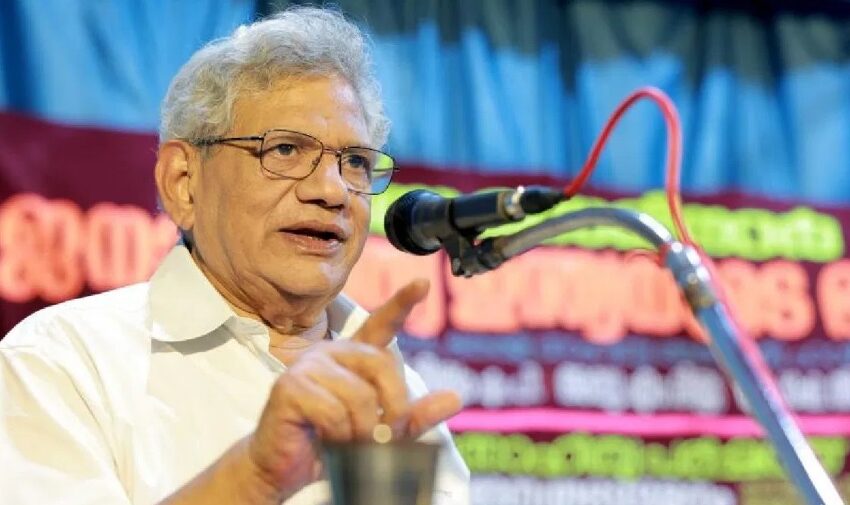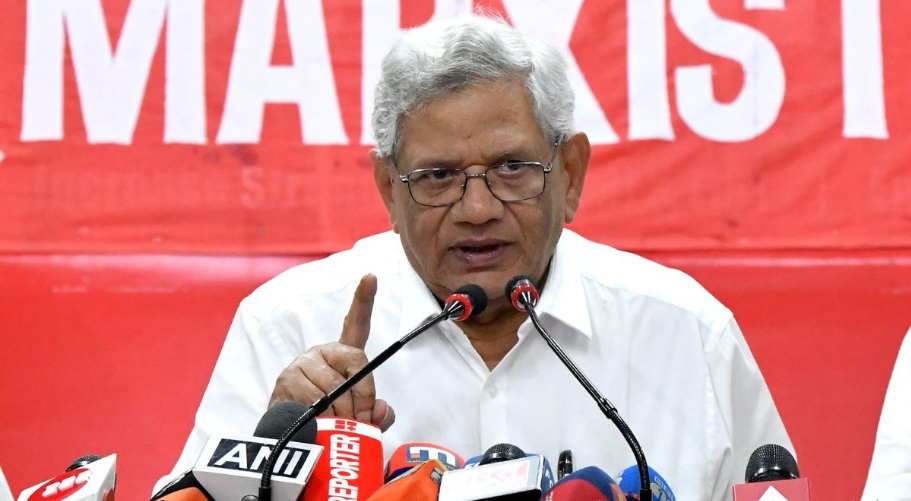
Delhi’s Beloved Comrade: Sitaram Yechury, the Accommodative Leftist, Passes Away
Yechury rose through the ranks starting his political career as a student leader at the Jawaharlal Nehru University (JNU) around 50 years back and became the CPI(M) chief in 2015
Communist Party of India (Marxist) or CPI(M) general secretary Sitaram Yechury, 72, who was known as an affable and accommodative Leftist and arguably the most popular face of his party in recent times, died on Thursday, New Delhi’s All Indian Institute of Medical Sciences (AIIMS) confirmed.
AIIMS professor in charge (medical cell) Rima Dada said Yechury, who was admitted to the hospital on August 19, was suffering from pneumonia. “The family has donated his body to AIIMS, New Delhi, for teaching and research purposes,” said Dada in a statement.
Yechury rose through the ranks starting his political career as a student leader at the Jawaharlal Nehru University (JNU) around 50 years back and became the CPI(M) chief in 2015. During his tenure, the party got into a pre-poll alliance for the first time with Congress and other Opposition parties to form the Indian National Developmental Inclusive Alliance (INDIA) last year.
A CPI(M) parliamentarian was elected for the first time from Rajasthan in the 2024 national polls even as the party and the wider Left bloc failed to gain lost ground, particularly in West Bengal which they ruled for 34 years. The party has no assembly or Lok Sabha seats in Bengal anymore. It also lost power in Tripura after 25 years in 2018. CPI(M) now has four lawmakers each in Lok Sabha and Rajya Sabha and 78 assembly members.
Yechury’s political clout, however, endured in the Opposition camp despite CPI(M)’s shrinking base. In the 1970s, he rose to fame when he stopped the then Prime Minister Indira Gandhi from attending a JNU event and read out the students’ demand for her resignation in her presence.
Yechury, however, forged a strong bond with former Congress president Sonia Gandhi and the leader of the Opposition in Lok Sabha Rahul Gandhi much to the annoyance of some CPI(M) and Congress leaders. When Congress leader Jairam Ramesh facetiously dubbed Yechury as “CPI(M) general secretary for Congress” at a press conference, Sonia Gandhi reprimanded her colleague for putting Yechury in trouble.
Yechury was the first non-Congress leader Sonia Gandhi called after she met President APJ Abdul Kalam in May 2004 ahead of the formation of the Congress-led United Progressive Alliance (UPA) government as she wanted to meet then CPI(M) chief Harkishen Singh Surjeet. Sonia Gandhi would break the news at Surjeet’s residence that she would not be the Prime Minister. Earlier this year, Yechury, who was also present there, told HT what happened. “Surjeet, down with fever, jumped up from a cot: ‘Kya bol rahi hai tu [what are you saying?]’. And then at her request, he started calling up alliance leaders to muster support for Manmohan Singh.”
Born in 1952 in Chennai, Yechury left his studies midway at Nizam College in Hyderabad and shifted to Delhi where he earned all-India first rank in the Central Board of School Education Class 12 exam in 1970. He studied economics at St Stephen’s College and JNU, where he first met Prakash Karat, a fellow communist.
Yechury and Karat were members of the UPA-Left coordination committee that met regularly in vain to hammer out differences over the India-US nuclear deal. But unlike the ideologically rigid Karat, Yechury opposed the idea of the Left, which had 60 lawmakers in the 543-member Lok Sabha, withdrawing support from the Congress-led government.
Yechury maintained the Left should not withdraw support from a secular government. He argued that the Left would be unable to claim credit for its interventions for successes such as the Mahatma Gandhi National Rural Employment Guarantee Act and Right to Information Act. Weeks later, when he was at an Indian embassy’s party in Moscow, the Indian ambassador broke the news: “Congratulations, your party has decided to allow us to go to the IAEA [International Atomic Energy Agency in connection with the nuke deal].” Yechury called Karat from the ambassador’s official telephone to ask how the party arrived at the decision.

The Left’s decision to withdraw support was a blow to moderates such as Yechury. A day after the Congress-led government won the trust vote after the withdrawal in July 2008 against the Left and the BJP, external affairs minister Pranab Mukherjee had only one visitor in his office—Yechury.
An ardent admirer of Surjeet and Jyoti Basu, Yechury accompanied the two leaders, P Rammurthy and M Basavapunnaiah to China. At the breakfast table on the first day, Yechury spoke to each of them in their native languages—Hindi, Bengali, Tamil, and Telugu. The next day, when Yechury arrived for breakfast, Basu declared, “This man [Yechury] is dangerous. He is talking in four different languages and although we are sitting here, none of us can understand what he is saying to others.”
On his first trip to Cuba, Yechury accompanied Basu to meet Fidel Castro. In their late evening meeting, a curious Castro asked Basu about India’s coal production and steel capacities. Basu, not the best one on statistics, fumbled. Castro turned to Yechury, “Young man, I can understand Basu is an aged person and might not remember these figures. But you should have known it.” Yechury said when he went to Havana again, he carried a book of Indian statistics.
Known as an endearing person, Yechury never shied away from parties, meeting people across the ideological divide, or embracing the best of the capitalist West. In his column Left Hand Drive for HT, he referred to Michael Jackson and Ustad Ali Akbar Khan in October 2009 and said: “This should also help settle, once again, the age-old philosophical battle between materialism and idealism by moving further to establish that the mind is the highest form of matter.”
Yechury loved his 2019 Oxford Union lecture and remained an admirer of Mahatma Gandhi. He was not his usual self since losing his son, Ashish, during the Covid-19 pandemic in 2021. Yechury retired from the Rajya Sabha four years earlier with House leader Arun Jaitley paying a rich tribute to his contemporary on the Communist leader’s last day as a parliamentarian on August 10, 2017. “On a personal note, I have had the privilege of probably knowing him [Yechury] longer in this House and earlier than most others. We were contemporaries in the university. He went from Delhi University to Jawaharlal Nehru University.”
Jaitley said they literally grew up within their organisations together. “From students’ organisations, we migrated into the political parties. I have seen him [Yechury] almost grow, with every passing day, within his organisation.”
Jaitley recalled that Yechury always had the same enthusiasm that he had during his student days. “He [Yechury] is ready to stand up and participate in almost every debate, making his views known. On a serious note, if I may say so, he has made an extremely valuable contribution as a Parliamentarian to almost every debate in which he has participated.”
Jaitley said some contributions raise the level of the debate in the House and, unquestionably, Yechury, in every debate that he participated, raised the level of that debate, and others who participated along with him had to measure up to the same standard.
Rajya Sabha remained Yechury’s favourite place. There, he would often tell the Chair: “The colour of the Rajya Sabha is red and that of the Lok Sabha is green because if the Lok Sabha green lights any faulty bill, the Rajya Sabha must show it the red light.”


